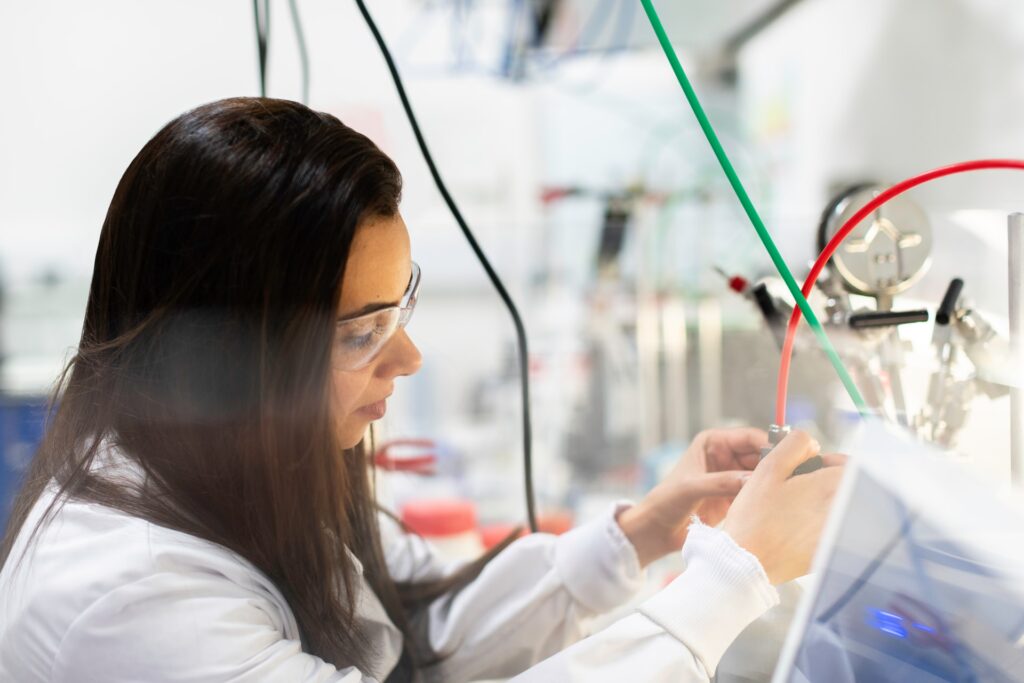What is Chemical Engineering?
Chemical engineering is the engineering branch that deals with chemical production and the manufacture of products through chemical processes. This includes designing equipment, processes and systems for refining raw materials and for compounding, mixing and processing chemicals to make valuable products.
It is a discipline influencing numerous areas of technology. In broad terms, chemical engineers come up with and design processes to produce, transport and transform materials, beginning with experimentation in the laboratory followed by implementation of the technology in full-scale production.
Chemical engineers are in high demand because of the large number of industries that depend on the processing and synthesis of materials and chemicals. In addition to traditional careers in the chemical, oil and energy industries, chemical engineers enjoy increasing opportunities in pharmaceuticals, biotechnology, electronic device fabrication and environmental engineering. The unique training of chemical engineers becomes essential in these areas when processes involve the physical or chemical transformation of matter.

Chemical engineers typically hold a degree in Chemical or Process Engineering. Practicing engineers may have professional certification and be accredited members of a professional body. Such bodies include the Institution of Chemical Engineers (IChemE) or the American Institute of Chemical Engineers (AIChE). A degree in chemical engineering is directly linked with all of the other engineering disciplines, to various extents.
History of Chemical Engineering
Chemical engineering is a discipline that was developed out of those practicing “industrial chemistry” in the late 19th century. George E. Davis, an English engineer, is credited with founding the field of chemical engineering.
Modern chemical engineering emerged with the development of large-scale, chemical-manufacturing operations in the second half of the 19th century. Throughout its development as an independent discipline, chemical engineering has been directed toward solving problems of designing and operating large plants for continuous production.
Manufacture of chemicals in the mid-19th century consisted of modest craft operations. Increase in demand, public concern at the emission of noxious effluents, and competition between rival processes provided the incentives for greater efficiency. The term chemical engineer was in general use by about 1900.
Despite its emergence in traditional chemicals manufacturing, it was through its role in the development of the petroleum industry that chemical engineering became firmly established as a unique discipline. The demand for plants capable of operating physical separation processes continuously at high levels of efficiency was a challenge that could not be met by the traditional chemist or mechanical engineer.
Study of the fundamental phenomena upon which chemical engineering is based has necessitated their description in mathematical form and has led to more sophisticated mathematical techniques. The advent of digital computers has allowed laborious design calculations to be performed rapidly, opening the way to accurate optimization of industrial processes. Variations due to different parameters, such as energy source used, plant layout, and environmental factors, can be predicted accurately and quickly so that the best combination can be chosen.
Chemical Engineering Education
Chemical engineers need at least a bachelor’s degree in chemical engineering, although those who want to pursue advanced roles in academia, management or research might need a graduate degree. Like other types of engineers, chemical engineers need state licensure to provide engineering services to the public.
Non-engineering requirements include extensive chemistry labs and courses, such as organic, analytical and physical chemistry. Other non-engineering requirements include sequences in calculus and physics. The engineering portion includes coursework and labs in chemical processes, transport, and reactions.

Students might prefer programs accredited by the ABET (Accreditation Board of Engineering and Technology) which has accredited more than 100 chemical engineering programs. Accreditation by ABET demonstrates the school adheres to a set of academic principles and teaches its students a core set of industry-required skills. Accreditation is required by many graduate schools and licensing boards.
Licensure
Licensure for chemical engineers is not as common as it is for other engineering occupations, nor is it required for entry-level positions. A PE (Professional Engineering) license, which allows for higher levels of independence and leadership, can be acquired later in one’s career. A PE can oversee the work of other engineers, sign off on projects, and provide services directly to the public. Each state issues its own licenses. Most states recognize licensure from other states, as long as the licensing state’s requirements meet or exceed their own licensure requirements. Several states require engineers to take continuing education to keep their licenses.
Chemical Engineering Careers
Jobs
Chemical engineering jobs fall into two main groups: development of new products and industrial applications. Chemical engineers may spend time at refineries, industrial plants and other locations, where they monitor or direct operations or solve on-site problems.
Manufacturing industries that employ chemical engineers include petroleum refining, plastics, batteries, paint, agricultural chemicals (pest control, fertilizers, and weed control), explosives, textiles, food processing, consumer products (cleaning, personal care, lawn care) and pharmaceuticals as well as chemical manufacturers that supply products to countless other industries.

Salaries
An entry-level chemical engineer with less than 1 year experience can expect to earn an average total compensation (includes tips, bonus, and overtime pay) of $66,334 based on 780 salaries. An early career chemical engineer with 1-4 years of experience earns an average total compensation of $71,418 based on 1,521 salaries. A mid-career chemical engineer with 5-9 years of experience earns an average total compensation of $86,096 based on 630 salaries. An experienced chemical engineer with 10-19 years of experience earns an average total compensation of $100,637 based on 374 salaries. In their late career (20 years and higher), employees earn an average total compensation of $123,302, according to PayScale.com.
The top companies for chemical engineers are ExxonMobil Corporation, E.I. Du Pont De Nemours & Co (DuPont) and Dow Chemical Co. Reported salaries are highest at ExxonMobil Corporation where the average pay is $102,086. Other companies that offer high salaries for this role include Dow Chemical Co and BASF Corporation, earning around $94,149 and $90,000, respectively. Honeywell International Inc pays the lowest at around $81,028. 3M Company and E.I. Du Pont De Nemours & Co (DuPont) also pays on the lower end of the scale, paying $81,231 and $86,389, respectively.
What Do Chemical Engineers Do?
Chemical engineers apply the principles of chemistry, physics, biology, and math to solve problems that involve the production or use of chemicals, drugs, fuel, food, and many other products. They design processes and equipment for large-scale manufacturing, plan and test production methods and byproducts treatment, and direct facility operations.
Responsibilities
Job responsibilities of a chemical engineer include:
- Conduct research to develop new and improved manufacturing processes
- Conduct tests and monitor the performance of processes throughout production
- Design and plan the layout of equipment
- Develop processes for separating components of liquids and gases, or for generating electrical currents, by using controlled chemical processes
- Establish safety procedures for those working with dangerous chemicals
- Estimate production costs for management
- Evaluate equipment and processes to ensure compliance with safety and environmental regulations
- Troubleshoot problems with manufacturing processes

Skills
Chemical engineers must still apply chemical engineering concepts, including mass and energy transfer, stoichiometry, unit operations, and fluid dynamics. Proficiency in regulatory requirements is also essential. Leadership, coaching, and change management abilities remain important in the 21st century, especially as engineers rise through the ranks.
Some other core skills a chemical engineer needs are:
- Analytical skills
- An aptitude for and interest in chemistry
- Commercial awareness
- Communication and team working skills
- IT and numeracy skills
- Problem-solving skills
- The ability to work well under pressure
Future of Chemical Engineering
The world population is exceeding seven billion and it is expected to be over nine billion by 2050. As the average life span gets longer, a higher standard of living is expected. While the demand for energy and resources rise, the responsibilities of chemical engineers shape the future of chemical engineering. A quick glance at the past of chemical engineering reveals its contribution to human progress. Chemical engineering plays an important role in providing and maintaining key resources like energy, water, food, health and well-being, through an increasing population and demand.
The potential of chemical engineering in managing resources is shaped by factors besides science and technological improvement. The answer to the question, why some of the solutions suggested by engineers are being discarded can be found through economic and political tendencies. Governments favor reliable economic activity, and these solutions cannot be applied until the economic conditions are proper. This is a particular problem since the major industries chemical engineers work for are heavily affected by political changes.

There are aspects that can be predicted for the future when it comes to the exhaustion of resources. The challenges grow as uncertainties arise through economics, politics, and public view. And yet, the role and responsibilities of chemical engineers remains central for the production and distribution of resources. Still there is a lot of technological development on the way, but the short term solutions can start today. Optimization of existing processes for a better resource management can be applied by process simulation technology we have today. The old process technology will stay with us a little longer, so it is up to chemical engineers to make the best of them.
If you have anything to add, please feel free to leave a comment down below, and sign up to our newsletter for more of the same content!



